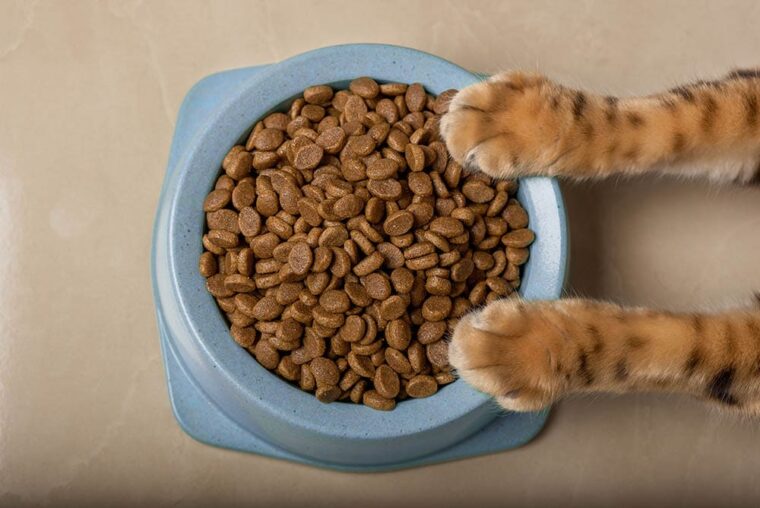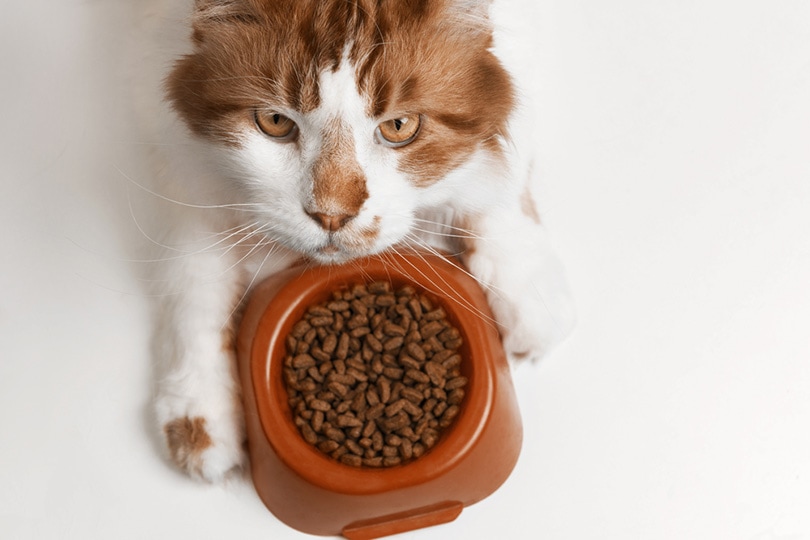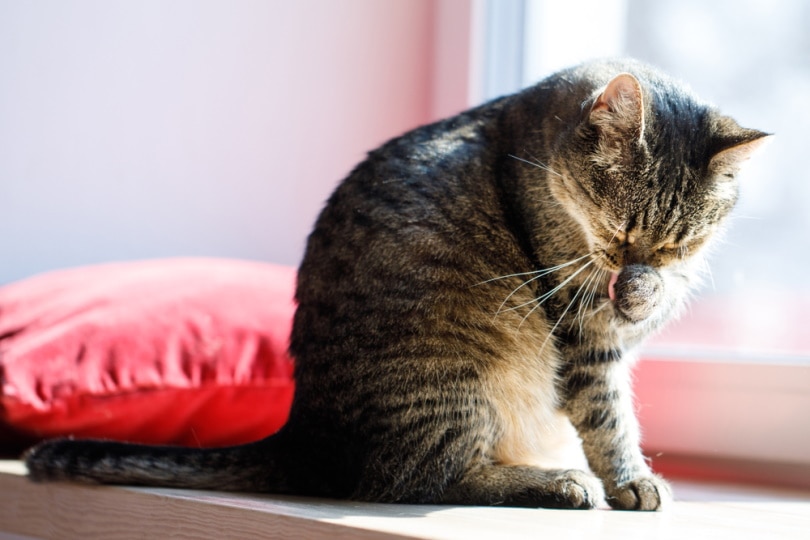
Cats exhibit a lot of perplexing and unexplained behaviors. One of the most common fascinating behaviors that many cat owners question is why their cat scratches around their food bowls. Every cat owner can attest to seeing their pet finish its meal and then get to work clawing at the floor. The kitty is focused on the task, often scratching at lightning speed, while the owners laugh at the silly behavior and scratch their heads in confusion.
While this behavior is funny to us, it’s something that cats take very seriously as it’s something that helps with the very survival of the species, which can go from the instinct of protecting their kittens to cleaning up. Or, at least, it helped ensure the species’ longevity when all cats were wild and didn’t have a fluffy cat bed to retreat to at night or a human to feed them three times a day.
Keep reading to learn about this baffling behavior and to find five common reasons your cat takes scratching around its food bowl so seriously.
The 5 Reasons Why Cats Scratch Their Food Bowl
1. To Hide the Scent of Its Food
Cats are obligate carnivores and need a diet that contains animal protein to survive. Wild and feral cats need to hunt and kill their own food. While you provide food for your housecat, and it doesn’t need to hunt for its next meal, its hunting instincts are still intact. Cats in the wild can easily fall prey to bigger predators, so they often bury what’s left of their food when they’re full to protect themselves. This is known as food caching. Buried food won’t smell as strong as food out in the open, so it will not attract scavengers or predators.
If you’ve recently adopted a second pet, you may notice your first cat food caching a lot. This is likely your original cat’s attempt at hiding its leftovers and their scent from your new kitty.

2. To Protect Its Kittens
If you have a mother cat who recently had a litter of kittens, you may notice her burying her food more often or for the first time. Researchers in Germany found that female cats are quick to respond to calls from their kittens that convey greater urgency, meaning that mother cats can evaluate the emotional context of their kitten’s mews and respond accordingly. Since a mother cat is very in tune and protective of her offspring, it only makes sense that she wouldn’t do anything that would potentially jeopardize their safety. She may try burying her food to protect her kittens.
3. For Pleasure
Behavior that you may think is scratching might actually be kneading. Your kitty may be kneading around its food dish as an act of pleasure. Kneading is a sign of contentment and is something your pet might do when it anticipates a pleasant experience (like eating a delicious meal). It is also a behavior that begins in kittenhood as a kitten will knead on its mother’s stomach as it’s nursing. Many cats will carry this behavior into adulthood, kneading on their humans, blankets, carpets, or their other furry siblings.
You may notice this behavior more often if the flooring around your cat’s food dish is carpet.

4. Because They Have Something to Say About Their Food
Your kitty might be scratching at its food bowl because you’ve served too much. It really comes back to your kitty trying to protect itself from predators. If your pet sees its uneaten food as something it won’t return to, its instincts tell it to hide it by burying it. Predators cannot find what they cannot smell. Even though your cat’s food stays perfectly still in its dish no matter how hard it tries to bury it, bless its sweet heart for trying to protect itself.
Your cat might also be scratching the floor because it simply is displeased with what you’ve served. Some cats will tell you they don’t like their food by not eating it, while others like to make a big show of it by trying to cover up the food as they do their feces.
5. To Clean Up
Cats are professional self-groomers, a behavior they learn in kittenhood. A mother cat’s first job is to remove the amniotic sac and lick her kittens to stimulate breathing. Once the kitten is older and starts nursing, the mother will lick at its hind end to encourage it to urinate and defecate. Kittens will start self-grooming within a few weeks of being born and will continue to groom themselves throughout their lives. In fact, cats can spend up to 50% of their day grooming.
Since cats are so inherently neat, they do what they can to keep their favorite spots tidy and spotless. Your kitty may be scratching at its dish to try and clean up the area.

Can I Stop My Cat from Scratching the Floor?
While pawing or scratching the floor aren’t harmful behaviors, you might want to discourage your cat if it starts ruining your flooring or carpet.
The easiest way to prevent floor scratching is to monitor your cat during meal time and remove the bowl when they’ve finished. You might also consider providing smaller portions to avoid any leftovers.
If you prefer to free-feed your kitty (leaving dry food portions out all day long), a puzzle feeder is a great investment that can stimulate your kitty’s instinctive need to hunt. This distraction may be all your cat needs to keep it from scratching.
Never punish your cat for scratching. Remember, while slightly annoying, this behavior is entirely natural and not harmful. Punishing your cat for doing what it was born to do can lead to problematic behaviors and also make it difficult for the two of you to bond.
Final Thoughts
The reason your cat is scratching around its food bowl boils down to protection. Even though your indoor cat is safe from predators that once killed its ancestors, this natural and instinctive behavior is something that’s been carried through its genes for centuries. Furthermore, scratching around the bowl is harmless and cute, so there’s really no need to worry if you notice your kitty doing this. Next time your cat is furiously pawing away around its food dish, think about its ancient ancestors and what they needed to do to survive in the wild.
Featured Image Credit: Svetlana Rey, Shutterstock






